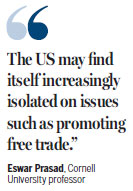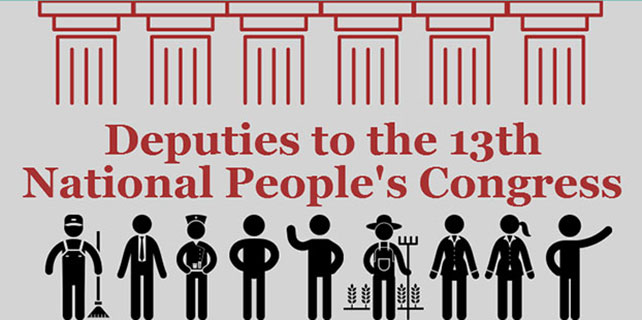Protectionism: a G20 point of concern
The US' rejection of language "to resist all forms of protectionism" in a communique coming out of the G20 meeting in Germany over the weekend has created growing concern over US President Donald Trump's possible trade policy.
Under the insistence of US Treasury Secretary Steven Mnuchin, the communique of the G20 finance ministers and central bank governors meeting has for the first time dropped the anti-protectionism language and instead just says "we are working to strengthen the contribution of trade to our economies".
Trump has been known for his anti-globalization and protectionist rhetoric during and after the 2016 presidential race. But his detailed trade policies have yet to be rolled out.

Eswar Prasad, a professor at Cornell University and a senior fellow at the Brookings Institution, said the Trump administration's repudiation of even a ritualistic statement about free trade in the G20 communique shows how the increasingly protectionist US stance could affect the global trading environment.
"The G20 communique may be a symbolic victory for Trump's protectionist agenda, but it comes at the cost of weakening US leadership on global economic issues," he told China Daily on Monday.
Prasad, a former IMF China division chief, believes the US stance is going to have a negative effect on the global trading environment, which could ultimately be to the detriment of the US economy itself.
He said resentment toward the US for straying from what are seen as core principles of the G20 is likely to linger and hurt the ability of the US to constructively influence the global economic policy agenda.
"The US may find itself increasingly isolated on issues such as promoting free trade and tackling climate change as other major economies begin to collaborate more closely with each other in response to US disengagement," Prasad said.
A Reuters report quoted G20 officials who interacted with Mnuchin at the meeting as saying that many opted not to challenge Mnuchin on protectionism language. They instead chose to give him and the new Trump administration some space to refine their trade views in the hopes for moderation by the time Germany hosts a G20 leaders summit in July.
Trump has blamed China, Mexico, Germany and many others for US trade deficits and the loss of manufacturing jobs. He has threatened high tariffs on imports into the US and to punish US companies outsourcing overseas.
Many economists, such as Gary Hufbauer of the Peterson Institute for International Economics, believe that automation and information technology played a large role in the reduction of manufacturing jobs in the US in the past decades. Many believe that the low personal savings rate and excessive spending in the US also are responsible for the trade deficits.
It was the first G20 meeting after Trump took office and the first for Mnuchin with his counterparts. G20 represents the world's 20 largest economies - 19 countries and the European Union.
Mnuchin and US Federal Reserve Chair Janet Yellen represented the US in meetings Friday and Saturday in Baden-Baden, Germany.
chenweihua@chinadailyusa.com
(China Daily USA 03/21/2017 page2)
















